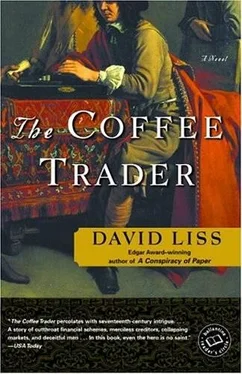Miguel made his way to the Talmud Torah unobserved by anyone from the community. At this hour the Vlooyenburg had just begun to stir, and though he heard the early morning cries of the milkmen and bakers, he crossed the bridge unheeded by all except a pair of beggars, who sat eating a loaf of stale and mud-splattered bread while eyeing Miguel suspiciously.
The Ma’amad held its meetings in the same building as the synagogue, but a separate entrance led to the chambers. At the top of a winding stairwell, Miguel stepped into the small familiar room where supplicants awaited their summonses. A few chairs had been set along the wall with semicircular windows behind them, allowing the early morning light to filter into a room smelling strongly of mildew and tobacco.
No one else awaited the call that morning but Miguel, and that was something of a relief. He hated making conversation with other penitents, whispering resentments and laughing off accusations. Better to wait alone. He paced back and forth and played out in his mind fantasy after fantasy: complete exoneration, excommunication, and all imaginable variations.
The worst would not happen, he told himself. He had always extricated himself from the council’s anger. And there was Parido-Parido, who was surely not Miguel’s friend but who wanted something from him. Parido, who had long known enough to have Miguel cast out and yet had not. There was no reason to believe he would let Miguel be cast out now.
He waited for nearly an hour before at last the door opened and he was ushered into the chamber. At a table at the far end of the room sat the seven men who would pass judgment. On the wall behind them was mounted the great marble symbol of the Talmud Torah: an immense pelican feeding its three young, the congregation having been formed of smaller synagogues some years before. The room reflected the wealth of the community’s elite with its lush India rug, handsome portraits of former parnassim, and an ivory cabinet in which records were stored. The men sat behind a massive dark table and looked both solemn and princely in their rich attire. To be a parnass a man must have the wealth to dress like a parnass .
“Senhor Lienzo, thank you for answering the summons.” Aaron Desinea, who led the council, spoke with a kind of arch seriousness. “Please.” He gestured to the narrow too-short chair that sat in the center of the room where Miguel would sit while in discussion with the council. One of the legs was shorter than the rest. It took far more concentration than Miguel could spare to keep from wobbling.
In the middle of his seventh decade, Desinea was the oldest of the parnassim and had begun to display signs of the ravages of age. His hair had gone from a stately gray to a sickly white and now had the coarse quality of dead leaves. His beard had grown spotty and molten, and it was generally known that his eyes were failing. Even now he stared beyond Miguel, as though looking for a friend in the distance. But Desinea had sat on the council many times, serving his three-year limit, standing down for the required three years, and then finding himself always reelected.
“You know everyone here, so I’ll dispense with introductions. I shall read the charges against you, and you will have an opportunity to answer them. Do you have any questions?”
“No, senhor.” Miguel felt himself longing for another bowl of coffee to sharpen his senses. Already he had become distracted, and he had to fight the childish urge to fidget.
“Of course.” Desinea allowed himself the vaguest hint of a smile. “By now you know the procedure well.” He held out a piece of paper, but his eyes made no contact with it. He must have memorized it earlier. “Senhor Miguel Lienzo-who is also known by and does business under the names Mikael Lienzo, Marcus Lentus, and Michael Weaver-you are charged with irresponsible conduct bringing shame before the Nation. You are accused of consorting with dangerous, disreputable, and inappropriate gentiles and bringing such gentiles into our own neighborhood, where they have behaved disruptively. Do you wish to respond to these charges?”
Miguel suppressed a smile, though he succumbed to the urge to breathe in the sweetness of the air. The meeting might be brought to its conclusion now, for the council would do him no harm. They did not know Joachim’s name or Miguel’s relationship with him. All the parnassim wanted was to hear an explanation and to issue a warning.
“Senhors, I should like to begin by offering my sincere apologies to this council and to the Nation. The man you mention is a Dutch unfortunate with whom, I admit, I have been friendly, but I can assure you that my intentions were always good.” He disliked lying in so holy a place, for it is written that a liar is no better than one who worships idols. But it is also written that the Holy One, blessed be He, hates a man who speaks one thing with his mouth and another with his heart. Therefore it seemed to Miguel that if he believed in his heart that his lie was justified, it was not so sinful after all.
“He is a sad man, ruined in a business misadventure,” he continued, “and seeing him begging upon the street, I gave him a few stuivers. Some days later, he engaged me in conversation, and not wishing to be rude, I made small chatter with him. The next time I saw him, he became aggressive and began to follow me, shouting things. Finally, he came into our own neighborhood and accosted members of my brother’s household. I then spoke to him harshly, warning him that if he continued to behave thus I would be forced to report him to the city authorities. I believe he won’t disturb our quiet again.”
“The giving of charity is one of our most important mitzvot,” said Joseph ben Yerushalieem. He was a wealthy merchant who had come to Amsterdam some months after Miguel and had been elected to the council after fulfilling (by a matter of weeks) the requirement that a parnass must have been living as a Jew for at least three years. Miguel knew he interpreted his duties as sourly as the Law would allow, showing no mercy to new arrivals who refused to embrace an equally strict adherence. “I commend you on your generosity, senhor, for charity exalts the Holy Name. This council is aware that you have suffered in business, but the rabbis say that a beggar must be treated kindly, for the Lord is with him.”
“Thank you, senhor ,” said Miguel, who refused to believe that the Lord could possibly be with Joachim.
“However,” ben Yerushalieem continued, “this incident demonstrates something that this body has warned you of many times in the past. Your easy interactions with the Dutch, your fluency in their language, and your comfort with their companionship can lead only to difficulties between our two peoples. This community has thrived because it has kept its distance from our Dutch hosts. This incident with the beggar may seem small, and you have been guiltless of any ill intent, but it suggests that you are unwilling to follow this council’s advice that you keep a more formal distance from these people.”
“This problem has been brought to our attention before,” Desinea chimed in. “You are a man who habitually breaks the laws of this council because he believes he knows better than we do what is right for the Nation.”
“Precisely.” Ben Yerushalieem pressed on. “You have broken the rules of the Ma’amad because you thought yourself the best judge of right and wrong. It makes no difference, senhor, if you are seeking the affections of a pretty Dutch girl or giving alms to an inappropriate gentile. Both are forbidden, and forbidden for good reasons.”
Miguel found the pressure more intense than he had at first anticipated. “I thank you for taking the time to discuss these matters with me and allowing me the opportunity to improve my behavior. I shall redouble my efforts to be more vigilant in considering my actions in light of the larger good of this community.”
Читать дальше












